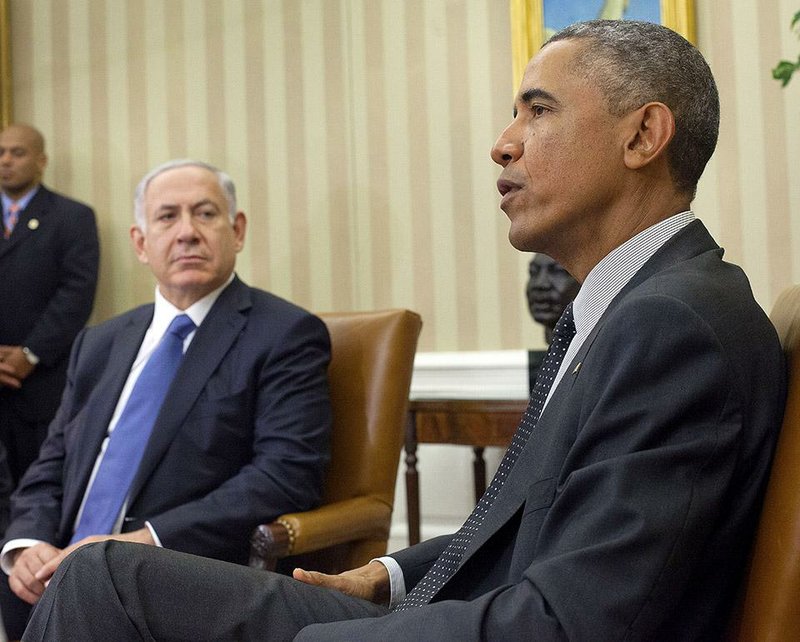WASHINGTON -- President Barack Obama's administration warned Israel on Wednesday that plans for a new housing project in east Jerusalem would distance Israel from "even its closest allies" and raise questions about its commitment to seeking peace with Palestinians.
The criticism came hours after Obama and Israeli Prime Minister Benjamin Netanyahu met at the White House. Obama spokesman Josh Earnest said the president raised his concerns about the construction project with Netanyahu, but the two leaders made no mention of the matter in their public comments.
"This development will only draw condemnation from the international community," Earnest said. "It also would call into question Israel's ultimate commitment to a peaceful negotiated settlement with the Palestinians."
The new 2,500-unit project is contentious because it would complete a band of Jewish areas that separate Jerusalem from nearby Bethlehem.
The Jerusalem municipality said in a statement Wednesday that Deputy Mayor Kobi Kahlon had approved the construction. A Jerusalem municipal official described the move as technical, saying the signature merely formalized a project that was approved three years ago.
The municipality statement appeared in a small local newspaper a week ago and was circulated by the anti-settlement watchdog Peace Now on Wednesday. Ariel Rosenberg, a spokesman for Israel's Housing Ministry, accused Peace Now of timing its announcement to sabotage the White House meeting.
The U.S. has repeatedly criticized Israeli construction in east Jerusalem, casting it as damaging to efforts to secure a peace accord with the Palestinians.
The White House on Wednesday also condemned what it called the occupation of residential buildings in the east Jerusalem neighborhood of Silwan. Earnest called the occupation "provocative" and said it would "escalate tensions at a moment when those tensions have already been high."
Also Wednesday, the Palestinians circulated a draft resolution asking the United Nations Security Council to set a deadline of November 2016 for an Israeli withdrawal from all Palestinian territory occupied since 1967, including east Jerusalem, in a new push to achieve independence.
The draft resolution would affirm the Security Council's determination to contribute to attaining a peaceful solution that ends the Israeli occupation "without delay" and fulfills the vision of two states -- "an independent, sovereign, democratic, contiguous and viable state of Palestine" living side by side with Israel in peace and security in borders based on those before the 1967 Mideast war.
Palestinian President Mahmoud Abbas has been under pressure at home to devise a new strategy to achieve Palestinian independence since a summer war with Israel in Gaza. But he also faces pressure from the U.S. not to pursue a resolution with a withdrawal deadline. Palestinian officials said the U.S. has signaled it will veto the resolution if necessary.
Israel's U.N. Ambassador Ron Prosor said the Palestinians' "habit of bypassing negotiations by taking unilateral action and blaming everyone but themselves will only move the region further away from stability."
U.S. Ambassador Samantha Power, asked about Abbas' call for a deadline, said, "We strongly believe that the only way of a negotiated solution is through negotiations between the two parties."
Earlier Wednesday, Obama and Netanyahu each took a polite and cordial tone in their brief public remarks. Still, areas of discord were evident, most notably Obama's frustration over Palestinian civilian deaths during the summer war in Gaza and Israel's wariness of U.S.-led nuclear negotiations with Iran.
Sitting alongside Netanyahu, Obama said leaders must "find ways to change the status quo so that both Israel citizens are safe in their own homes, and schoolchildren in their schools, from the possibility of rocket fire but also that we don't have the tragedy of Palestinian children being killed as well."
More than 2,100 Palestinians -- the vast majority of them civilians -- and more than 70 Israelis were killed during the 50-day war in Gaza.
Officials said much of Obama and Netanyahu's private discussions centered on Iran. The U.S. and its negotiating partners -- Britain, France, Germany, Russia and China -- have until Nov. 24 to reach a deal with Iran on its nuclear program, and all sides say significant gaps remain.
The West suspects Iran is secretly trying to build a nuclear weapon alongside its civilian atomic program, something that Israel sees as an existential threat. Iran insists its nuclear program is for peaceful purposes.
"Iran seeks a deal that would lift the tough sanctions that you worked so hard to put in place and leave it as a threshold nuclear power," Netanyahu told Obama. "And I firmly hope under your leadership that would not happen."
Information for this article was contributed by Edith M. Lederer and Josef Federman of The Associated Press.
A Section on 10/02/2014

